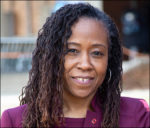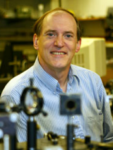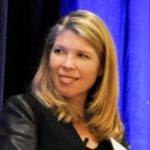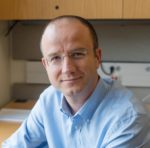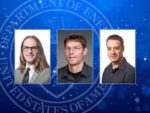
In this monthly feature, we’ll keep you up-to-date on the latest career developments for individuals in the high-performance computing community. Whether it’s a promotion, new company hire, or even an accolade, we’ve got the details. Check in each month for an updated list and you may even come across someone you know, or better yet, yourself!
Jamika Burge is the recipient of the 2021 Richard A. Tapia Achievement Award for Scientific Scholarship, Civic Science and Diversifying Computing. Burge is the director of experience products and platforms design at Capital One and the co-founder of BlackComputeHER, an organization dedicated to supporting computing+tech education and workforce development for Black women and girls.
Burge is also the founder and principal of Design & Technology Concepts, LLC. The Richard A. Tapia Achievement Award recognizes a distinguished computational scientist, computer scientist, or computer engineer who contributes to civic areas such as teaching, mentoring, advising, and building and serving communities.
Shyamnath Gollakota of the University of Washington is the recipient of the 2020 ACM Grace Murray Hopper Award for contributions to the use of wireless signals in creating novel applications, including battery-free communications, health monitoring, gestures recognition, and bio-based wireless sensing.
Gollakota’s work re-imagined what can be done using wireless systems. The ACM Grace Murray Hopper Award annually recognizes an outstanding young computer professional who is selected based on a single recent major technical or service contribution. A prize of $35,000 accompanies this award.
Berkeley Lab appointed Monica Hernandez to its newly created role of quantum communications lead in the Quantum Information Science and Technology Group. Hernandez has worked for Ad Astra Rocket Company and Microsoft and has managed pan-regional public relations campaigns for Airbus and Ryder.
“I’m very excited about being part of the dawn of the second quantum revolution by supporting quantum information science at Berkeley Lab, in particular by focusing on communications for the Quantum Systems Accelerator and the Advanced Quantum Testbed,” Hernandez said.
Ayanna Howard was named the 2021-2022 ACM Athena Lecturer. Howard, dean of The Ohio State University College of Engineering, was recognized for her contributions in developing accessible human-robotic systems and artificial intelligence and forging new paths to broaden participation in computing through entrepreneurial and mentoring efforts.
Howard is considered a leading roboticist, entrepreneur, and educator whose research includes dexterous manipulation, robot learning, field robotics, and human-robot interaction. Her research also includes studying the overtrust that people place in robots in various autonomous decision-making settings.
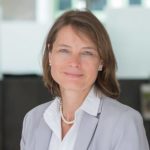 Astrid Lambrecht was named a board member of Forschungszentrum Jülich. A quantum physicist, Lambrecht is responsible for the Institute for Advanced Simulation (IAS), the Jülich Centre for Neutron Science (JCNS), the Ernst Ruska Center for Microscopy and Spectroscopy with Electrons (ER-C) and the Peter Grünberg Institute (PGI) as well as the Helmholtz Nano Facility (HNF). Since 2007, Lambrecht has been research director at the CNRS – an academic title that corresponds to the German professor. From 2014 to 2015 she was deputy director of the LKB, from 2016 deputy scientific director at the CNRS headquarters for the scientific division physics, which she headed since 2018.
Astrid Lambrecht was named a board member of Forschungszentrum Jülich. A quantum physicist, Lambrecht is responsible for the Institute for Advanced Simulation (IAS), the Jülich Centre for Neutron Science (JCNS), the Ernst Ruska Center for Microscopy and Spectroscopy with Electrons (ER-C) and the Peter Grünberg Institute (PGI) as well as the Helmholtz Nano Facility (HNF). Since 2007, Lambrecht has been research director at the CNRS – an academic title that corresponds to the German professor. From 2014 to 2015 she was deputy director of the LKB, from 2016 deputy scientific director at the CNRS headquarters for the scientific division physics, which she headed since 2018.
Steve Lyon joined EeroQ, a company founded in 2016 with the mission to build a commercial quantum computer using electrons trapped on the surface of superfluid helium, as its chief technology officer. Lyon will retain his duties as a professor at Princeton University.
“Engineers and scientists are working on a range of technologies for building a large scale quantum computer, but one of the most compelling approaches is to use electrons bound to the surface of superfluid helium,” noted Professor Lyon. “This technology holds promise for fast submicron quantum gates, comparable to silicon-based qubits, but with long-coherence mobile qubits, like trapped ions, and with device structures which have been fabricated using an unmodified CMOS foundry process. I began research in this field almost 20 years ago, and we have developed device models for quantum gates and demonstrated the ability to select electrons and rapidly move them around a chip without loss. I am excited to expand and accelerate progress in this field with EeroQ.”
 Michele Macready, Mark Snedeker, Jennifer Houston, and Mark Johnson
Michele Macready, Mark Snedeker, Jennifer Houston, and Mark Johnson
Michele Macready and Mark Snedeker joined D-Wave, a provider of quantum computing systems, software and services, as its senior vice president of software, cloud, and professional services and its VP of professional services, respectively. Macready brings more than 25 years of experience as a technology consultant, and Snedeker spent 27 years at Accenture as a managing director.
In addition, D-Wave announced that Jennifer Houston was promoted to chief marketing officer. She will run the company’s marketing, communications, demand generation, product marketing, and public affairs initiatives. Mark W. Johnson, Ph.D., was promoted to VP of D-Wave’s quantum technologies and systems products. Johnson was instrumental in developing all the iterations of the Advantage system, a commercial quantum system.
 Nadya Mason, Laura Gagliardi, Michael Wasielewski
Nadya Mason, Laura Gagliardi, Michael Wasielewski
Nadya Mason from the University of Illinois at Urbana-Champaign; Laura Gagliardi from the University of Chicago; and Michael Wasielewski from Northwestern University were elected to the National Academy of Sciences. Mason was also elected to the American Academy of Arts and Sciences.
All three Chicago Quantum Exchange scientists will be inducted at the academy’s annual meeting in 2022. Mason, elected to the AAAS, is one of 252 new members elected this year, a class that includes artists, philosophers, journalists, scientists, and leaders in public, nonprofit and private sectors.
Photonic computing company Lightmatter appointed the former chief operating officer of Dropbox, Olivia Nottebohm, to its board of directors. At Dropbox, Nottebohm managed sales, business development, partnerships marketing, customer success, support, people and communications. Before joining Dropbox, Nottebohm held leadership sales and go-to-market roles at Google, and was a technology practice partner at McKinsey & Company.
“I am delighted to welcome Olivia to our board,” said Lightmatter co-founder and CEO, Nick Harris. “It is a testament to Lightmatter’s potential and ambitions for future growth and impact that we have been able to appoint someone of such incredible caliber and experience. I look forward to partnering with her as we accelerate through this next crucial stage of the company.”
The Oden Institute for Computational Engineering and Sciences selected Ufuk Topcu as the 2021 Peter O’Donnell Distinguished Research Award recipient, presented annually recognizing Oden Institute faculty who demonstrated a sustained level of distinguished research in computational science and engineering. Topcu is an associate professor at the department of aerospace engineering and engineering mechanics at UT Austin.
“I am honored to receive the award,” said Topcu. “The Oden Institute has provided an excellent environment to conduct research and recruit great students. I am planning to utilize the funds that come with the award toward attracting an increasingly diverse group of students.”
Rambus Inc. appointed Karen Rogge to its board of directors. Rogge brings finance and operations management experience, having worked at public technology companies such as Hewlett Packard, Seagate Technology, and Extreme Networks. Currently, she is president of the RYN Group LLC, a management consulting business.
“Rambus’ products and technology are at the heart of some of today’s fastest-growing markets,” said Rogge. “I am honored to join the board and look forward to helping guide the company in its future success.”
 Margo Seltzer, Mike Olson, Keith Bostic
Margo Seltzer, Mike Olson, Keith Bostic
Margo Seltzer from the University of British Columbia; Mike Olson, who worked at Cloudera; and Keith Bostic from MongoDB were selected to receive the ACM Software System Award for Berkeley DB, an early example of the NoSQL movement and forged the “dual-license” path to software licensing.
Berkeley DB was the transactional key/value store for a range of first- and second-generation internet services, including account management, mail and identity servers, online trading platforms. The ACM Software System Award recognizes those that develop a software system that has had a lasting influence, reflected in contributions to concepts, in commercial acceptance, or both.
Frank Würthwein will be the interim director at the San Diego Supercomputer Center located at UC San Diego while a search is underway to replace outgoing Director Michael Norman. Würthwein is the lead of the Distributed High-Throughput Computing at SDSC, a faculty member in the Department of Physics, and a founding faculty member of the Halıcıoğlu Data Science Institute on campus.
“It’s an honor and my great pleasure to be taking on this responsibility, especially now, when SDSC is at the forefront of so many exciting new technologies to accelerate science,” said Würthwein. “I’d like to express my gratitude and give kudos to SDSC for using exciting new technologies to accelerate science.”
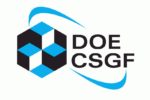 2021-2022 Department of Energy Computational Science Graduate Fellowship
2021-2022 Department of Energy Computational Science Graduate Fellowship
Thirty-two fellows were selected to join the 2021-2022 Department of Energy Computational Science Graduate Fellowship, which was established in 1991 to train top leaders in computation science. The new fellows are training to apply high-performance computing to research across various fields, from atmospheric science to condensed matter physics and quantum information. To read the full list, click here.
2021 Department of Energy’s Early Career Research Program
The Department of Energy’s Office of Science selected 83 scientists to join the DOE’s Early Career Research Program and receive significant research funding. The awardees represent 41 universities and 11 DOE National Laboratories in 32 states. DOE national laboratories-based researchers will receive grants of about $500,000 per year to cover year-round salary plus research expenses. The research grants are planned for five years.
Pacific Northwest National Laboratory scientists selected for the 2021 DOE Early Career Research Program are Marcel D. Baer and Nathan R. Tallent from the Physical and Computational Sciences Directorate and Ben Loer from the National Security Directorate. For more on the three researchers selected, click here.
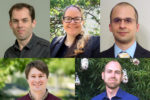
Berkley Lab’s Robert Saye, Heather Crawford, Marcos Turqueti, Simone Pagan Griso, and Benjamin Cole.
Six researchers – Corey Adams, Melina Avila Coronado, Lindsey Bleem, Si Chen, Sheng Di, and Xueying Lu – at the U.S. Department of Energy’s Argonne National Laboratory received 2021 DOE Early Career Research Program awards. For more on the six researchers selected, click here.
Lawrence Berkeley National Laboratory’s five scientists selected for the 2021 DOE Early Career Research Program award are Robert Saye, Heather Crawford, Marcos Turqueti, Simone Pagan Griso, and Benjamin Cole. For more on the five researchers selected, click here.
To read last month’s edition of Career Notes, click here.
Do you know someone that should be included in next month’s list? If so, send us an email at [email protected]. We look forward to hearing from you.




